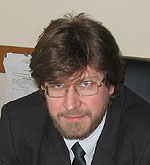© «Russia
in Global Affairs». №
4, October — December 2007

Russia has
officially entered the hectic election period, and despite the
political stability that has been reached in the country, the
political campaign season has not become a routine matter. Thus,
President Vladimir Putin is demonstrating a creative approach to
the challenge and refuses to let the political elite
relax.
Few
individuals will dare give detailed forecasts about further
developments in the country; yet, this does not seem to be crucial
since the main principles of Russia’s political model will not
noticeably change. Thus, contributors Svetlana Babayeva and Georgy
Bovt discuss what exactly the participants in the election campaign
in Russia should be thinking about – not so much about forms and
rates of the country’s development, as the fundamental goals of
this development.
Western
commentators are racking their brains about whether or not the
present chill in Russia-West relations has any relation to the
election campaign. The standard conclusion is that the Kremlin’s
tough foreign-policy rhetoric is a product for internal use only.
Once the elections are over, the rhetoric will change.
Of course,
one may invent whatever conclusions one likes, since power in
Russia is far from being transparent. Yet, it would be an
oversimplification to explain changes in Moscow’s approaches to
international affairs by the political situation inside the
country. The outgoing year was marked by an advance in Russia’s
understanding of the present world order and the role this country
plays in it.
An article
by Foreign Minister Sergei Lavrov is perhaps the first detailed
exposition of Russia’s approaches to acute problems and, moreover,
the philosophy of Russia’s foreign policy. The head of the Russian
State Duma’s International Affairs Committee, Konstantin Kosachev,
analyzes the underlying reasons for the lack of understanding
between Russia and the West. Also in this issue, Sergei Karaganov
provides an analysis of the state of Russia-West relations. He
warns about the coming of a “New Epoch of Confrontation” brought
about by the restoration of Russia’s positions in the world and by
the weakening of the “traditional West.”
Ivan
Krastev argues that the present differences between Russia and the
West derive from the essence of ‘sovereign democracy,’ a concept
that may well be described as the official ideology of Russia. In
his view, Russia’s approaches are rooted in the European tradition
which, however, is opposite to the one that is dominant in the
European Union today. This view is challenged by Leonid Polyakov,
who interprets Krastev’s arguments as a desire to substantiate a
breach between Russia and the EU.
Hiski
Haukkala urges Russia and the EU to come to the realization that in
our 21st-century world neither side will be able to become a global
leader on their own. This is why they should open a new page in
their relations and focus on integration projects, above all in the
field of energy. This is the main idea of the articles by Vlad
Ivanenko and Vladimir Milov. Vladimir Feygin and Vladimir Revenkov
share their views concerning the idea of a “gas OPEC” which is
causing apprehension among European clients of Russia’s fuel/energy
sector.
On a
different note, Olga Butorina writes about the difficulties the EU
faces due to its enlargement. Has this organization become too
heterogeneous? Russian veteran diplomat Yuri Dubinin recalls the
repercussions of Charles de Gaulle’s slogan about a “Europe from
the Atlantic to the Urals” in Nikita Khrushchev’s
Russia.
Igor
Zevelyov and Mikhail Troitsky analyze Russian-U.S. relations
through the prism of Washington’s views of Russia and China. Alek
Epstein in his article comes to a discouraging conclusion
concerning the development of relations between Russia and Israel.
Ten years ago, these relations seemed to hold promise, but the two
countries have not made much progress in their bilateral ties since
then.
The
Chairman of the National Assembly of Armenia, Tigran Torosyan,
offers an interesting view on a key problem of modern politics,
namely the future of ‘unrecognized states’ and the relation between
various principles of international law.
Finally,
our Personage section provides an interview with a veteran of world
politics, Hans Blix, the former Director General of the
International Atomic Energy Agency and the head of a UN inspection
commission that was tasked to verify whether Saddam’s Iraq
possessed weapons of mass destruction.
Our next
issue will continue with discussions on European affairs; it will
also focus on issues involving Central Asia, the Korean settlement,
and many other subjects.










